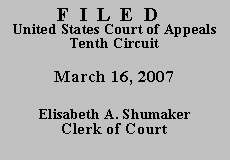

| UNITED STATES OF AMERICA, |
|
| v. | |
| ROBERT W. MONTGOMERY, |
After Montgomery pleaded guilty, the United States at sentencing moved for a four-level upward departure under United States Sentencing Guideline §5K2.1 because Montgomery's wife's death resulted from his unlawful possession of firearms. Several witnesses testified at the June 10, 2004 hearing on the government's motion, and based on that testimony the district court found Montgomery contributed to his wife's suicide because he treated her violently and interfered with her treatment for depression. Consequently, the district court granted the government's motion and imposed a two-level upward departure.
Two days later, the Supreme Court decided Blakely v. Washington, 542 U.S. 296 (2004). In light of Blakely, Montgomery moved for reconsideration of the district court's decision to grant an upward departure. The district court decided to "continue to apply the sentencing guidelines, but without additional fact-finding by the Court that might result in an upward enhancement or departure that would result in a sentence above that which would otherwise apply under the guidelines, absent those findings." United States v. Montgomery, 324 F. Supp. 2d 1266, 1271 (D. Utah 2004). The court specifically noted that the facts regarding Montgomery's treatment of his wife "were improperly found by this Court and must be vacated." Id. at 1272. Accordingly, the court vacated the upward departure order and sentenced Montgomery to 57 months, the top of the Guidelines range. Id. at 127273.
Both Montgomery and the United States appealed the sentence. Montgomery's appeal was dismissed on his own motion on June 27, 2005. In the United States' appeal, we reversed Montgomery's sentence and remanded for re-sentencing because the district court had concluded that Blakely precluded it from departing upward from the Guidelines range. United States v. Montgomery, 439 F.3d 1260, 1263 (10th Cir. 2006). To the contrary, we noted under United States v. Booker, 543 U.S. 220 (2005), that district courts retain discretion to depart upward or downward from the Guidelines range, subject to review for reasonableness based on the factors in 18 U.S.C. § 3553(a). Montgomery, 439 F.3d at 1262. On remand in November 2006, Montgomery was again sentenced to 57 months.
Prior to remand, Montgomery made several filings in the district court. In August and December 2005, while his case was on appeal, Montgomery submitted a series of letters accusing witnesses at the June 10, 2004 hearing of perjury and requesting that the court compel a third party to release his deceased wife's medical records to him. The court construed Montgomery's letters as an attack on his sentence under 28 U.S.C. § 2255 and opened a civil case for Montgomery to pursue the matter. The court notified Montgomery of its action under our rule that a district court may not construe a pro se litigant's motion as a request for relief under § 2255 without warning the litigant about the consequences and giving the litigant an opportunity to withdraw or amend the motion. See United States v. Martin, 357 F.3d 1198, 1199 (10th Cir. 2004). Montgomery responded by withdrawing his construed § 2255 motion and requesting that the civil case be dismissed. Pursuant to Montgomery's request, the district court dismissed the civil case.(1)
This is an appeal from that civil case, No. 2:05-cv-01049-TS. We note that Montgomery is also pursing an appeal from his sentence in criminal case No. 2:03-cr-801-TS in this court. See United States v. Montgomery, No. 06-4300 (10th Cir. appeal docketed Dec. 7, 2006). The single issue Montgomery raises in this civil appeal concerns the district court's refusal to hold a witness in contempt for perjury. Because that issue is more properly before the court in the criminal appeal, we dismiss the instant appeal.
The issues Montgomery raises in this appeal developed in the context of his criminal proceeding. The testimony Montgomery alleges was perjured was offered at the June 10, 2004 hearing in his criminal case. Although Montgomery filed his initial pro se request for a contempt order under both his civil and criminal case numbers, his counsel filed a similar motion under the criminal case number on November 3, 2006. The court denied the motion at Montgomery's criminal re-sentencing hearing on November 6, 2006.(2) Montgomery's Docketing Statement in the criminal appeal, filed on March 6, 2007, refers to Montgomery's allegations of perjury and the district court's ruling on the motion for contempt. Therefore, Montgomery may properly raise issues surrounding the motion for contempt in his criminal appeal.
Montgomery's filings in the instant appeal raise no issues with respect to his civil case. Montgomery's request for a Certificate of Appealability is therefore DENIED, and this appeal is DISMISSED.
Entered for the Court
Timothy M. Tymkovich
Circuit Judge
*. This order and judgment is not binding precedent except under the doctrines of law of the case, res judicata and collateral estoppel. It may be cited, however, for its persuasive value consistent with Fed. R. App. P. 32.1 and 10th Cir. R. 32.1.
2. After examining the briefs and the appellate record, this three-judge panel has determined unanimously that oral argument would not be of material assistance in the determination of this appeal. See Fed. R. App. P. 34(a); 10th Cir. R. 34.1(G). The cause is therefore ordered submitted without oral argument.
1. The court additionally denied Montgomery's request to order the release of his wife's medical records. The court noted that the records were irrelevant to any attack on Montgomery's sentence since her death was not a factor considered in re-sentencing. The court furthermore referred to indications at Montgomery's 2006 re-sentencing that Montgomery could obtain the requested medical records directly from the hospital. In fact, Montgomery's September 1, 2006 "Request for a Contempt Order" references various medical records, and Montgomery does not renew his request regarding medical records on appeal.
2. In its order dismissing the civil case, the court reiterated that it had disposed of the motion for contempt at the re-sentencing hearing.